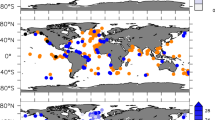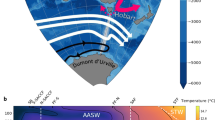Abstract
A MODEL of Southern Ocean circulation has been provided by Deacon1 based on that for the South Atlantic and supported by detailed observations made during the cruises of R.R.S. Discovery II. On this model, cold dense water forming in the Weddell Sea sinks to the ocean floor to form Antarctic bottom water which exhibits northward and eastward components of motion.
This is a preview of subscription content, access via your institution
Access options
Subscribe to this journal
Receive 51 print issues and online access
$199.00 per year
only $3.90 per issue
Buy this article
- Purchase on Springer Link
- Instant access to full article PDF
Prices may be subject to local taxes which are calculated during checkout
Similar content being viewed by others
References
Deacon, G. E. R., Discovery Reports, 15, 1 (1937).
Kulp, J. L., Atomics, 4, 96 (1953); J. Chem. Educ., 30, 432 (1953).
Cooper, L. H. N., J. Mar. Biol. Assoc., 35(2), 341 (1956).
Author information
Authors and Affiliations
Rights and permissions
About this article
Cite this article
BRODIE, J., BURLING, R. Age Determinations of Southern Ocean Waters. Nature 181, 107–108 (1958). https://doi.org/10.1038/181107a0
Issue Date:
DOI: https://doi.org/10.1038/181107a0
This article is cited by
-
A Radiocarbon Profile in the Tasman Sea
Nature (1958)
Comments
By submitting a comment you agree to abide by our Terms and Community Guidelines. If you find something abusive or that does not comply with our terms or guidelines please flag it as inappropriate.



